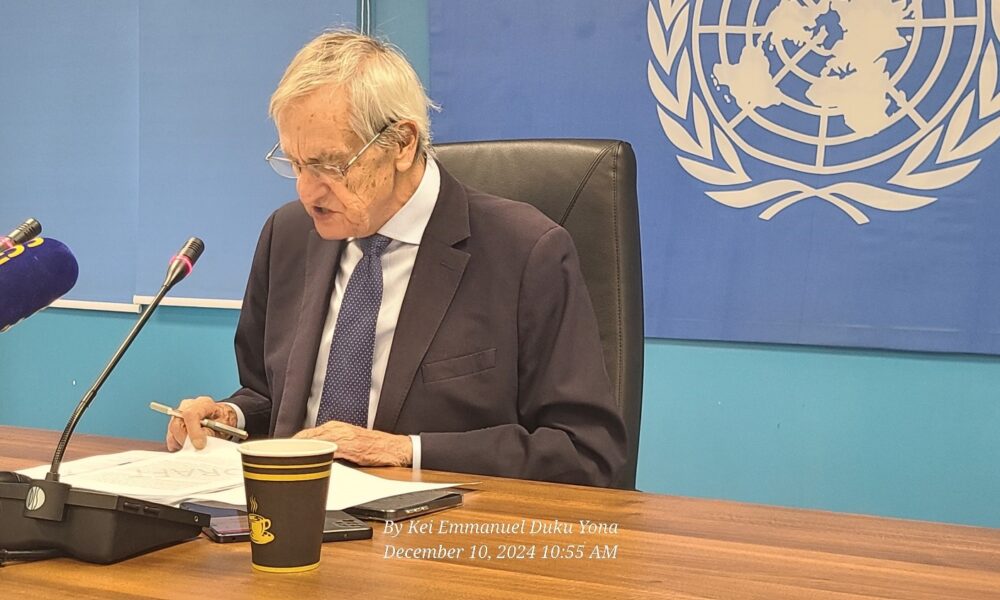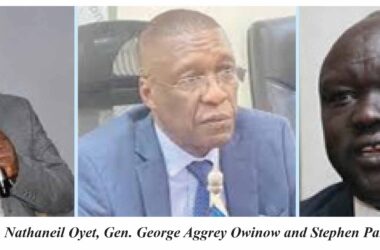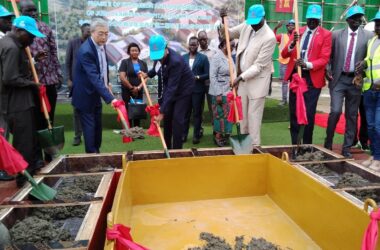By Kei Emmanuel Duku
United Nations Mission in South Sudan (UNMISS) has hailed the significant role Mobile courts have played in bringing justice and addressing backlog of cases in areas where Rule of Law is fragile.
Since its establishment, mobile court system, operating in collaboration with South Sudan’s judiciary, South Sudan People’s Defense Forces (SSPDF) Military Justice Directorate, and other stakeholders, has tried over 40 cases.
These mobile courts provide access to justice in regions affected by conflict and climate-related disasters, such as flooding, which have disrupted the normal functioning of the country’s justice system.
One notable example is Mayom County in Unity State, where the mobile court has processed 31 cases, leading to the release of 22 prisoners and the conviction of 24 others.
Nicholas Haysom, the Special Representative of the Secretary-General and UN Head of Mission in South Sudan stated that some of the cases that have already been tried under the mobile courts include theft, murder, sexual violence, and many others.
“The impact is quite significant, these courts have created confidence among communities, even within a short time, that justice may be delayed but not denied,” said Haysom.
He further underscored the importance of the courts in reducing case backloads on the country’s customary courts which in the absence of the legal structures quite often take long to rule over cases and others lack the necessary expertise to handle cases such as murder or sexual violence.
Relatedly in Koch County of Unity State, a school teacher who had spent eight months in prison for stealing chairs had his sentence overturned when the mobile court ruled that his punishment was disproportionate.
Another significant achievement is the successful prosecution of military personnel.
In Yei River County, Central Equatoria State, a General Court Martial, supported by UNMISS, convicted 11 SSPDF members of various offenses, including murder and sexual violence.
The individuals were sentenced to 10 years in prison, dismissed from the military, and asked to pay compensation to the survivors
“Our first successful military court was in Yei where men in army uniforms were convicted for rape never before in the history of this country, complaints were excited and the local population yarning the mobile court justice system because it is a mechanism for combatting impunity, building trust between military and civilians, improving discipline and order in the SSPDF, and advancing peace and stability in Yei River County and other parts of the country” he added.
The General Courts Martial which presided over the military cases in Yei River County comprised of three female judge-advocates which helped ensure that both female and male victims and witnesses felt comfortable while participating in the justice process.
Before their deployment, Haysom said consultations between civilians and military personnel were held to enhance community awareness and ownership of the justice process.
The mobile courts have also employed innovative methods, such as video conferencing, to overcome geographical challenges.
In Malakal, a murder suspect was successfully tried through video conferencing, ensuring a timely and fair trial.
He said the suspect whose case was tried virtually was linked to an offense that could lead to a capital sentence and during the hearing exhibits leading to the prosecution and the defense, witnesses provided testimony, and the investigator presented the findings virtually.
Haysom stated that after speedy and thorough deliberations and presentation of evidence, Andrew Joshua Lado, the Juba High Court Judge, found the suspect guilty of a reduced count of manslaughter, and due sentencing took place.
In the course of the court proceedings, witnesses; Community Watch Group members from the UN Protection of Civilians site; and UNMISS representatives were invited to attend the court sessions in the presence of local justice actors in the Malakal-UNMISS Field Office.
Haysom emphasized the positive impact of these mobile courts, stating that they have instilled confidence in communities, reduced case backlogs, and promoted accountability.




